Integrating AI into leadership practices can significantly enhance decision-making, operational efficiency and strategic planning.
i-Gizmo has listed some key aspects of how Leaders can effectively incorporate AI into their roles:
Enhancing Decision-Making
- Data-Driven Insights: AI can analyze vast amounts of data quickly, providing leaders with actionable insights and helping them make more informed decisions.
- Predictive Analytics: By using predictive models, AI can forecast trends and outcomes, allowing leaders to anticipate challenges and opportunities.
Optimizing Operations
- Process Automation: AI can automate repetitive tasks, freeing up leaders and their teams to focus on more strategic activities.
- Resource Allocation: AI tools can optimize resource allocation by identifying the most efficient use of time, budget, and personnel.
Improving Customer Experience
- Personalization: AI can analyze customer data to offer personalized experiences and services, enhancing customer satisfaction and loyalty.
- Customer Support: AI-driven chatbots and virtual assistants can provide 24/7 customer support, resolving common issues and improving response times.
Enhancing Employee Engagement and Productivity
- Performance Monitoring: AI can monitor and analyze employee performance, providing leaders with insights into productivity and areas for improvement.
- Talent Management: AI tools can assist in recruitment, employee development, and retention by identifying the best candidates and tailoring development programs to individual needs.
Strategic Planning and Innovation
- Scenario Planning: AI can simulate different business scenarios, helping leaders understand potential impacts and make strategic choices.
- Innovation: AI can identify emerging trends and technologies, enabling leaders to innovate and stay ahead of the competition.
Ethical and Responsible AI Use
- Bias and Fairness: Leaders must ensure that AI systems are fair and unbiased. This involves regular audits and transparent algorithms.Data Privacy:
- Maintaining high standards of data privacy and security is crucial when using AI, particularly with sensitive customer and employee data.
Developing a Culture of AI Adoption
- Training and Education: Leaders should invest in training programs to upskill employees in AI literacy and foster a culture that embraces AI.
- Change Management: Effectively managing the transition to AI-integrated processes is essential. This includes clear communication, setting realistic expectations, and addressing concerns.
Collaboration Between Humans and AI
- Complementary Strengths: Leaders should focus on leveraging AI to complement human strengths rather than replace them. AI excels at data processing and pattern recognition, while humans excel at creativity, empathy and strategic thinking.
- Team Integration: Encourage collaboration between AI tools and teams to enhance overall performance and innovation.
i-Gizmo has listed practical steps for Leaders to follow:
Identify AI Opportunities:
~ Conduct an assessment to identify areas where AI can add value in your organization.
~ Prioritize AI projects that align with your strategic goals.
Invest in the Right Tools:
~ Select AI tools and platforms that are scalable, secure, and suitable for your business needs.
~ Ensure these tools integrate well with your existing systems.
Foster a Data-Driven Culture:
~ Promote a culture that values data-driven decision-making.
~ Encourage employees to use AI insights in their daily work.
Ensure Continuous Learning:
~ Keep abreast of AI advancements and industry best practices.
~ Provide ongoing learning opportunities for yourself and your team.
Monitor and Evaluate:
~ Continuously monitor the performance of AI systems.
~ Gather feedback from users and make necessary adjustments to improve AI integration and effectiveness.
Leadership with AI involves a strategic approach to integrating technology into various aspects of business operations. By leveraging AI, leaders can enhance decision-making, optimize processes and drive innovation, all while maintaining ethical standards and fostering a collaborative, data-driven culture. The key is to balance AI’s capabilities with human strengths, ensuring a synergistic relationship that propels the organization forward.
#ArtificialIntelligence #Leadership #DecisionMaking #OperationalEfficiency #StrategicPlanning #AIinBusiness #Innovation #CustomerExperience #EmployeeEngagement #TalentManagement #EthicalAI #AIAdoption #DataDriven #BusinessStrategy #FutureOfWork #ChangeManagement #TechnologyIntegration #AIandLeadership #AITrends #DigitalTransformation




